Discovering Small Birds as Ideal Companions
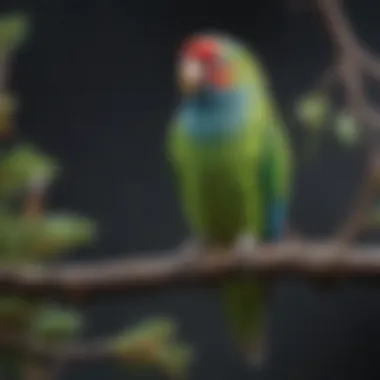
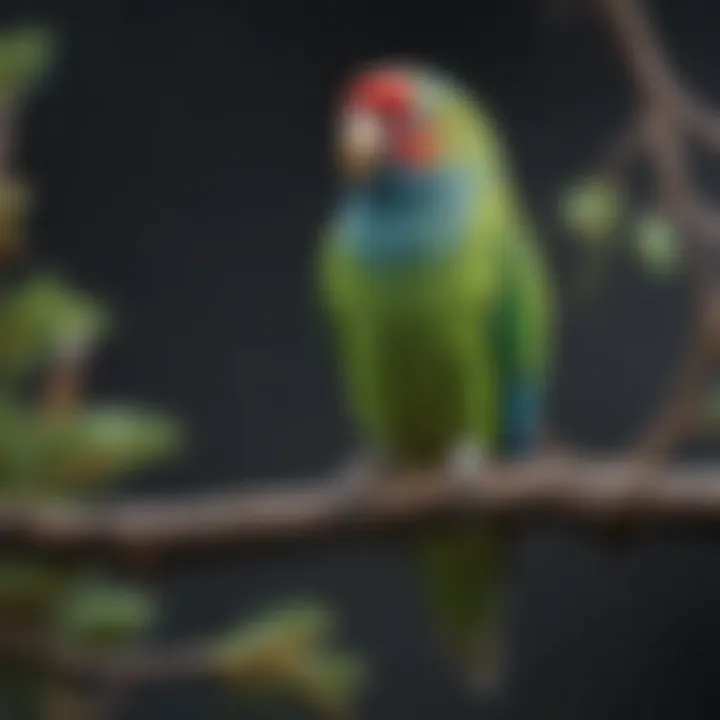
Intro
Small birds have carved a niche in the hearts of many pet lovers. Their vibrant colors, delightful chirps, and engaging personalities add a unique touch to any home. While they may be smaller in stature compared to dogs and cats, these avian companions bring a joy that is hard to match. From the lovable budgerigar to the sophisticated finch, each species comes with its own set of traits and demands.
If you've ever found yourself mesmerized by the sweet song of a canary or the vibrant plumage of a lovebird, you are not alone. People increasingly choose small birds for companionship, with good reason. They require less space, often making them suitable for apartments and homes with limited room. Additionally, caring for these little creatures can be a rewarding experience, both emotionally and socially. Through this article, we'll dive into understanding small birds as pets, their care, training needs, health considerations, and ways to enrich their lives, ensuring a happy and thriving environment for both pet and owner.
Preamble to Small Birds
When it comes to adopting a pet, small birds often fly under the radar compared to more conventional choices like dogs or cats. However, the world of small birds as pets is rich and varied, offering numerous benefits that can enhance a household's dynamics. These charming creatures can bring life to a space, creating a joyful atmosphere that many pet owners cherish. This article aims to explore the captivating realm of small birds, shedding light on their unique characteristics, care needs, and the delight they add to our lives.
The Appeal of Small Birds
There's something undeniably special about small birds. Their ability to flit about, chirp away, and sometimes mimic human sounds can be endearingly captivating. They often require less space than larger pets, making them ideal for apartments or smaller homes. Not to mention, these birds are relatively low-maintenance when compared to the time and resources needed for dogs or cats.
Moreover, many small birds form strong bonds with their owners. For example, a budgerigar, or budgie, can learn to recognize and respond to its owner’s voice, becoming a lively companion. People often find solace in their simple, yet playful, antics. They can be engaging and bring a sense of calmness, making them excellent companions for families or individuals looking for a touch of nature in their homes.
"Small birds provide companionship that’s both fulfilling and uncomplicated, often becoming treasured members of the family without overburdening the home."
Why Choose a Small Bird as a Pet?
Choosing a small bird as a pet can be an enriching decision for several reasons:
- Affordability: Generally speaking, small birds, such as finches or canaries, are more affordable than larger pets. Their initial costs, from purchasing to setting up their surroundings, tend to be more budget-friendly.
- Low Maintenance: Compared to the daily walks and grooming routines of dogs, small birds require less effort. Regular feeding, cage cleaning, and occasional health checks are typically all that's needed.
- Educational for Kids: For families with children, small birds can serve as a fantastic educational tool. Kids can learn responsibility through feeding and care while enjoying the vibrant interaction that comes with bird ownership.
- Limitless Variety: From the vibrant feathers of lovebirds to the melodious songs of canaries, small birds come in numerous shapes and colors. This variety caters to different tastes, allowing potential bird owners to choose one that speaks to their personality.
- Space-Saving: Living in a space-restricted area? A small bird can flourish in a relatively small cage, so you don’t need a mansion to accommodate them.
In summary, small birds are more than just attractive pets; they're companions that provide joy, learning opportunities, and an ease of care that makes them suitable for a wide array of lifestyles.
From single apartment dwellers to large families, embracing small birds can lead to a rewarding experience filled with chirps, songs, and delightful interactions.
Common Small Bird Species
In the vibrant realm of avian companionship, understanding the various small bird species serves as the cornerstone for choosing the right feathered friend. Small birds not only encapsulate diverse personalities and behavior, but they also demand specific environments and care routines. Thus, prospective bird owners should familiarize themselves with the nuanced traits and needs of popular species.
Budgerigars (Budgies)
Budgerigars, commonly known as budgies, are among the most beloved small birds globally. Their playful disposition and vivid plumage make them a charming addition to any household. These birds are renowned for their incredible vocal skills, often mimicking sounds and even human speech. Budgies are social creatures and thrive on interaction, making them ideal for families and individuals. However, it's crucial to provide them with ample engagement, whether through toys or companionship, as boredom can lead to undesirable behaviors.
Canaries
Canaries are small songbirds famed for their melodious tunes. They are often celebrated for their aesthetic beauty and vary in colors from bright yellows to deep reds. One of the appealing aspects of canaries is their relatively low-maintenance care requirements. They do not typically require social interaction to be happy, which makes them suitable for people with busy lifestyles. Still, it's vital to provide a spacious cage equipped with perches and toys to keep their environment stimulating.
Finches
Finches are perhaps the most colorful small birds one can keep as pets. They come in various species, each with distinct markings and social behaviors. What’s fascinating about finches is their inherent tendency to thrive in groups. Keeping a small flock ensures their happiness, as they engage in social activities and display charming interactions. They're less prone to enjoying direct human interaction, so observing their antics can be quite rewarding for owners. Care for finches involves a spacious cage, a balanced diet, and stimulating activities.
Lovebirds
Lovebirds are aptly named for their affectionate nature and tight bonds with their partners, whether with another bird or their human caregivers. These small birds exude vivacity and curiosity. However, potential owners must understand that lovebirds require significant attention. They can become quite attached, often following their human from room to room. Their playful antics are entertaining, yet proper socialization and training are critical to prevent issues such as jealousy or aggression.
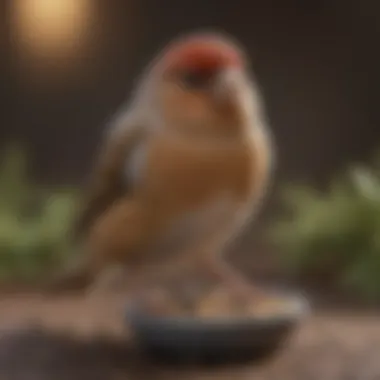
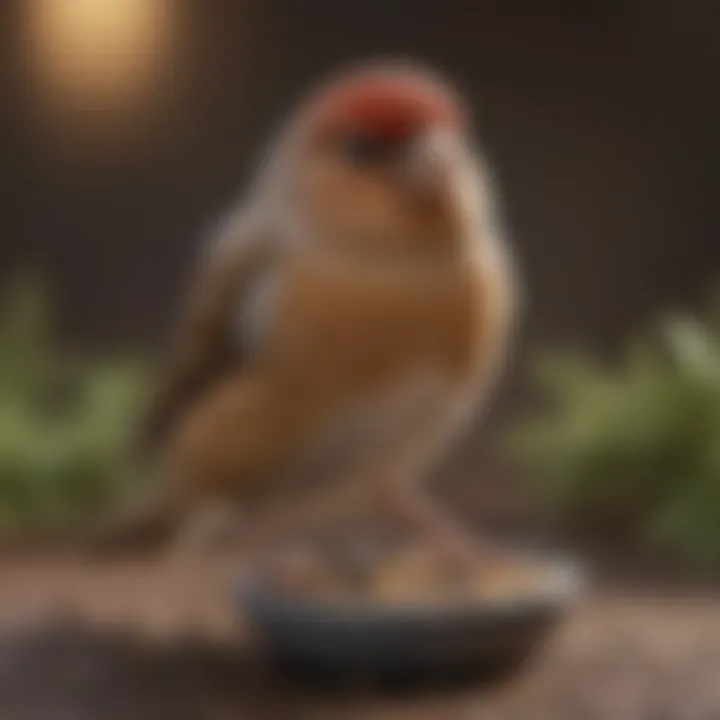
Cockatiels
Cockatiels are beloved for their gentle demeanor and charming whistling ability. Their unique crest adds to their character, making them easily recognizable. Cockatiels form strong bonds with their owners, often leaning toward interactive play and companionship. They can be trained to perch on fingers and perform tricks, providing a rewarding experience for dedicated bird owners. It’s essential to balance freedom and security, as cockatiels love to explore but can be vulnerable to hazards in their environment.
Understanding Small Bird Behavior
Understanding the behavior of small birds is critical for any prospective or current bird owner. Knowing how these feathered friends think and act helps create a harmonious living environment. A crucial aspect of pet ownership revolves around establishing trust and communication. After all, birds are social creatures with instinctual behaviors that stem from their wild origins.
When you comprehend the nuances of their behavior, you can anticipate their needs, respond to their moods, and, ultimately, foster a more fulfilling relationship. The beauty of small birds lies not only in their vibrant appearances but also in their intricate social behaviors and communication styles, which strengthen the bond between you and your pet.
Social Nature of Avian Companions
Small birds, such as budgies and cockatiels, thrive on social interaction. They aren't just content to sit silently in their cage; they are eager to engage and develop connections. In fact, many discover that the social nature of these pets is one of their most delightful attributes.
- Small birds often form flocks in the wild, which translates to a strong desire for companionship in captivity.
- They exhibit different behaviors like preening, vocalizing, and playing together, which are vital for their emotional well-being.
- Birds that feel isolated can show signs of distress, including feather-plucking and excessive screaming.
It’s a good idea to spend regular quality time with them or consider adopting more than one bird to ensure they have a companion for socialization.
Communication Patterns
Communication among small birds can be a dance of chirps, whistles, and body language. Each species boasts its unique vocalizations that signify various feelings or needs.
- Chirping is often a sign of contentment, while screaming may indicate boredom or discomfort.
- Small birds may also display body language—such as flapping wings, puffing up feathers, or head bobbing—as a way to communicate.
Understanding these signals can enhance your relationship with your pet. For instance, when a bird fluffs up its feathers, it may be either trying to keep warm or feeling relaxed. Instead of only observing, engage with your bird by mimicking its sounds, encouraging a form of communication that can bridge the gap between you and your feathered friend.
Play and Enrichment
Play is an essential component of a small bird's daily routine. Just as children need toys, birds thrive on activities that challenge and stimulate them. You'll find that a bored bird can lead to destructive behavior, so providing enriching experiences is key.
- Toys: Rotate a variety of toys to keep your bird engaged. Objects that squeak, swing, or can be shredded offer different textures and experiences.
- Exploration: Allow your bird to explore outside its cage safely. Supervised time on a play gym or in a bird-safe area of the house can spark natural curiosity and promote mental stimulation.
- Social Play: Engage in interactive games with your bird. You might try training them to perform simple tricks or teaching them to use a foraging toy that dispenses treats.
Incorporating these elements into your bird’s day goes a long way in fostering a happy, healthy companion. Always be attentive to how your bird interacts with various aspects of its environment to better assess what keeps it entertained.
"Birds are not just pets but companions that share their lives with us. Understanding their behavior enriches our experiences and fosters a loving bond.”
By grasping the behaviors of small birds, you provide them with a nurturing environment that meets their social, communicative, and play needs. This contributes significantly to their overall well-being and can be immensely rewarding for both you and your pet.
Care Requirements for Small Birds
Taking care of small birds is a rewarding journey but not without its challenges. Understanding their care requirements is fundamental to ensure they thrive in your home. These tiny creatures can bring vibrancy and happiness to any space, but it’s crucial to recognize that their well-being significantly hinges on how well their needs are met.
Fulfilling their specific needs not only keeps them happy and healthy but also enhances the bond between you and your feathered friend. A well-cared-for small bird exhibits better behavior, is less prone to stress, and can potentially live longer.
Choosing the Right Cage
Choosing the right cage for your small bird isn't just about style or aesthetics; it’s about ensuring a safe and comfortable environment. When selecting a cage, you should consider the species of bird you own, as different birds have varied space requirements.
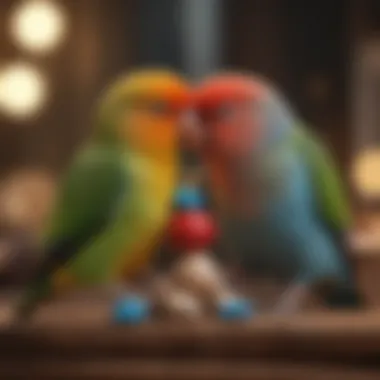
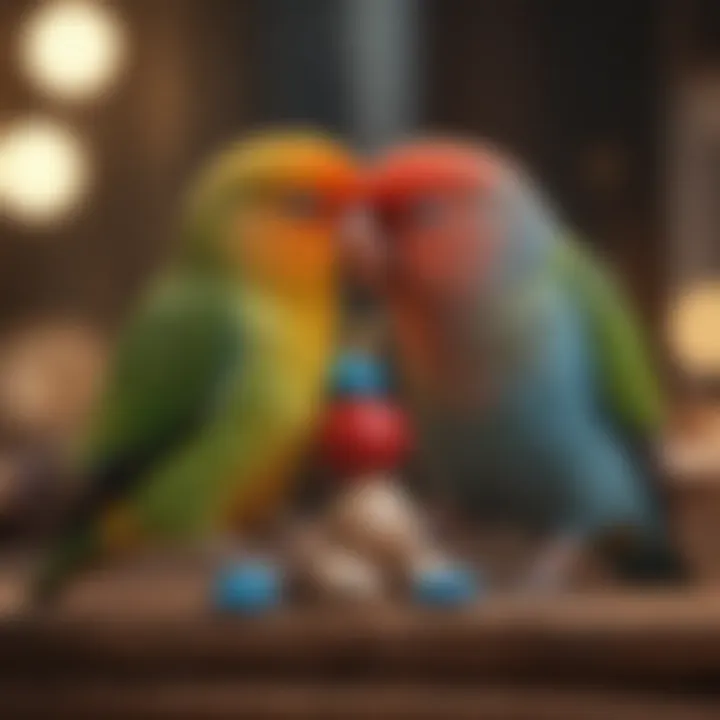
- Size Matters: The cage should be spacious enough for your bird to spread its wings fully. As a rule of thumb, the larger the cage, the better, as it allows for movement and exercise. For example, a cockatiel will thrive in a larger cage compared to a finch.
- Bar Spacing: Ensure that the spacing between the bars is appropriate for the species. Small birds can easily escape through wide gaps, while those with small heads can get stuck in tight spaces.
- Material: Opt for durable and non-toxic materials. Metal cages are often preferred, as they are easier to clean and maintain compared to wooden ones.
- Flooring: A removable tray under the cage makes cleaning a breeze. Keeping the cage clean is key to preventing health issues.
"A well-thought-out cage setup not only keeps your bird safe but can also enhance their social and exploratory instincts."
Ideal Environment Setup
Setting up an ideal environment for your small birds is another essential aspect of their care. Birds are naturally curious and active creatures. They need an environment that reflects their natural habitat to remain healthy and engaged.
- Perches and Toys: Provide a variety of perches of different thicknesses and materials. This aids in natural foot health. Additionally, include toys to keep their minds stimulated and prevent boredom. Make sure to rotate the toys periodically to keep them excited.
- Space for Flight: If possible, allow for some out-of-cage time in a bird-safe area. This gives them room to fly and explore, which is crucial for their physical and mental health.
- Lighting: Birds benefit from natural sunlight. Place their cage near a window, but ensure that it's not too hot or cold. Proper lighting is crucial for their mood and activity levels.
Feeding and Nutrition Essentials
Feeding small birds is quite the culinary adventure, as they have diverse dietary needs. Proper nutrition is vital for their overall health and can impact everything from feather condition to energy levels.
- Quality Seed or Pellets: A high-quality seed mix or fortified pellets should form the basis of their diet. Each species may have specific preferences; for example, budgerigars thrive on a mix that includes canary seed, while lovebirds may lean towards a fruit-based diet.
- Fresh Fruits and Vegetables: Supplement their diet with fresh produce like leafy greens, carrots, or apples. It's essential to wash fruits and veggies thoroughly to remove pesticides.
- Avoid Toxic Foods: Awareness of foods that are toxic to birds is key. Avocado, chocolate, and certain nuts can be harmful, so it’s best to research beforehand.
- Water Supply: Always ensure that fresh, clean water is available. Change the water daily to avoid any contamination.
In summary, the care of small birds involves a multilayered approach, considering elements such as their environment, cage, and dietary needs. Fostering a rich and nurturing space will set the stage for a happy and resilient avian companion.
Health Considerations
Taking care of small birds involves not just providing a cozy space for them, but also ensuring they are healthy and thriving. Birds communicate through behavior and subtle signs, often making it tricky for owners to identify health issues. Understanding their unique physiology and common ailments is crucial for fostering a rewarding companionship. Recognizing when your feathered friend needs care can lead to years of happiness and bonding, offering both you and the bird a fulfilling interaction.
Common Health Issues
Small birds, like any pets, can suffer from various health issues. It’s essential to be aware of these to act swiftly when needed. Here are some prevalent concerns:
- Respiratory Problems: Birds are prone to respiratory infections caused by allergens or unsuitable living conditions. Keep the living area clean and ventilated to avoid these issues.
- Obesity: Overfeeding and lack of proper activities can lead to obesity in small birds. This can result in many other health problems, including heart disease. Monitoring their diet is important.
- Feather-plucking or Molting Issues: A bird that constantly plucks its feathers may be under stress. It can also sometimes indicate a dietary deficiency or health condition.
- Gastrointestinal Ailments: Birds can develop various digestive problems, often caused by an unhealthy diet or stress. A carefully balanced and nutritious diet can help mitigate this.
- Tumors and Internal Diseases: Some small birds may develop tumors or suffer from internal diseases. Regular vet check-ups can aid in early detection.
Being vigilant and informed about these conditions allows bird owners to provide better care and react promptly when something seems off with their pets.
"An ounce of prevention is worth a pound of cure." Knowing what to look for can save your bird’s life.
Routine Veterinary Care
Establishing a regular check-up routine is critical for the well-being of small birds. A vet with experience in avian medicine can provide valuable insights that regular pet doctors might not. Here’s what to keep in mind:
- Annual Check-ups: Just as with dogs and cats, small birds should see a vet at least once a year. A thorough examination will help detect issues before they become serious.
- Vaccinations: Discuss with your vet about necessary vaccinations to protect your bird from common diseases. Staying updated on vaccines can enhance your bird's lifespan and quality of life.
- Health Assessments: During checkups, your vet will likely assess your bird's weight, feather condition, and overall demeanor. Bringing your pet's favorite treat can sometimes make this process easier for both you and your bird.
- Fecal Testing: Regular screening of droppings helps spot gastrointestinal parasites or infections, which can be common in pet birds. The vet can suggest appropriate treatments if problems arise.
- Behavioral Observations: Don’t forget to share any changes in behavior or appetite with your vet. Even minor shifts can hint toward underlying health issues that need addressing.
Taking small birds for routine checks can foster a longer, happier life for them, and as a pet owner, it ensures that you are doing your bit in maintaining their health.
Fostering a well-rounded understanding of health considerations paves a way for a stronger bond between you and your feathery companion.
Socialization and Training
Socialization and training go hand in hand when it comes to small birds. These aspects are crucial not just for establishing a bond between the bird and its owner but also for ensuring the bird leads a happy and healthy life. The right socialization techniques promote confidence and adaptability in these feathery companions. By understanding how to properly socialize and train your bird, you can significantly enhance its quality of life as well as yours.
Building Trust with Your Bird
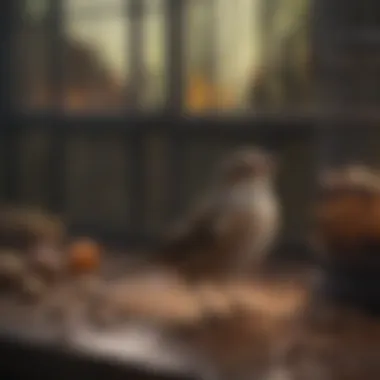
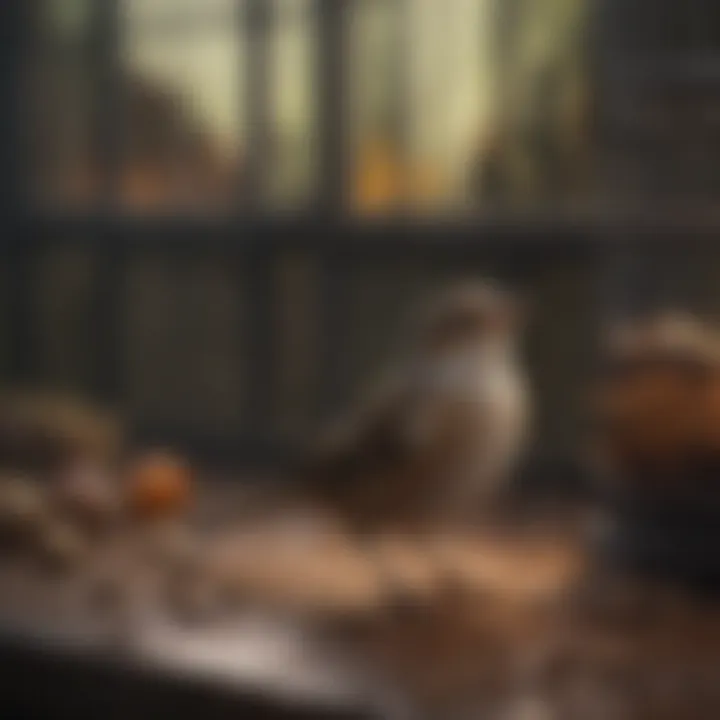
Establishing trust is the cornerstone of your relationship with a small bird. Unlike dogs or cats, birds approach the world with both curiosity and caution. To build trust, be patient. Start by simply sitting near the bird's cage, allowing it to become comfortable with your presence. Your body language should be relaxed; sudden movements may scare it. Once your bird seems at ease, try offering treats through the bars or slowly opening the cage door.
Many owners find that conversation helps, too. Talk to your bird regularly, even if it feels silly. Soft, gentle words can help the bird feel more secure in your company. Also, pay attention to its body language. If the bird leans towards you or fluffs its feathers, that’s a good sign of trust. Involvement over a period will make the bird more willing to interact with you.
Basic Training Techniques
Training a small bird is both an art and a science. Start with simple commands like "step up" where you teach the bird to step onto your finger or a perch. Begin with a familiar environment, as distractions can hinder progress. Use rewards like small pieces of fruit or a favorite seed to reinforce positive behavior.
Here are a few basic techniques:
- Target Training: Use a stick as a target; when the bird touches it, reward it with a treat. This helps train the bird to associate an action with a positive outcome.
- Clicker Training: A clicker can also be an effective tool. Each time the bird performs a desired action, click and reward. This method helps the bird understand which behaviors are encouraged.
- Consistency is Key: Birds are creatures of habit. Consistent commands and daily practice will yield the best results.
Training requires time and patience, but the payoff is immense. Building a rapport can transform your living space, making it much more enjoyable for both you and your avian friend.
"A bird's trust once gained is a treasure, and it takes time to cultivate that relationship."
Challenges of Owning Small Birds
Understanding the challenges is as important as knowing the appeals of owning small birds. While these pets can bring immense joy and companionship, they also come with their own set of considerations that potential owners must weigh carefully. Each challenge can be a teaching moment, encouraging a deeper bond and knowledge between the owner and their avian companion.
Time Commitment
Owning a small bird demands a significant investment of time. Unlike a fish in a bowl that requires just feeding and occasional cleaning, small birds need more interaction and care. Birds, by their very nature, are social creatures. Many species thrive on companionship, whether it be with their human caretakers or fellow birds.
Engaging with your bird daily is crucial. This means spending quality time outside their cage, allowing them to explore safely under supervision. Training sessions, playtime, and simply talking to them can greatly influence their happiness and well-being. If the bird feels neglected, it may lead to behavioral issues, such as excessive noise or feather plucking.
Moreover, routine maintenance is essential. Cleaning the cage, changing water and food, and ensuring their environment is safe and stimulating can take up a sizable chunk of your weekly schedule. A lapse in either can affect their health and happiness, creating a ripple effect that reaches beyond the bird itself.
Many owners may underestimate this time requirement, so being mindful of your daily routine and commitments becomes vital before making such a decision. Taking on a small bird means adjusting your life rhythm in sync with its needs. It's not just owning a pet; it's about enhancing each other’s lives through commitment and care.
Potential Noise Levels
One of the common misconceptions about small birds is that they are quiet pets. In reality, birds can be quite vocal, with some species being known for their astonishing capacity to fill a room with sound. From chirping melodies to loud squawking, their vocalization is part of their charm but also a challenge.
Consider the type of small bird you're interested in before bringing one home. Cockatiels, for instance, are known for their whistling. Budgerigars, or budgies, can engage in endless chatter, particularly if they bond with their owners or other birds. These sounds can be delightful to some, while others may find it grating, especially in a shared living environment.
Here are a few things to think about regarding noise:
- Species Matters: Different birds have different noise levels. Research to find species that might fit your tolerance.
- Time of Day: Birds tend to vocalize more during dawn and dusk, responding to natural light changes. This might take some getting used to.
- Environment: If you live in an apartment or a close community, consider noise ordinances. A loud chirp may not be welcomed by neighbors.
Communicating effectively with your bird can help mitigate excessive noise. Training techniques can redirect their vocalizations when it becomes too boisterous, but the initial novelty of their sounds can wear thin if not managed well. Keeping an open mind and being prepared for the potential racket is crucial for a harmonious pet ownership experience.
"Owning a bird is a symphony of joy and responsibility—the key is in managing the tempo."
When contemplating the joys of having a small bird as a pet, it’s essential to balance the delights with the realities of time and noise demands. Commit to understanding these challenges, and you’ll cultivate a fulfilling relationship that flourishes with love and understanding.
Epilogue
In wrapping up our exploration of small birds as pets, it’s vital to understand the significant advantages these charming creatures can bring into our homes. Their vibrant presence not only livens up a space but also cultivates a sense of companionship that is both rewarding and fulfilling.
Summarizing the Benefits of Small Bird Companionship
Small birds have earned their place as delightful companions for a reason. Here are some striking benefits:
- Social Interaction: They tend to bond closely with their owners, providing emotional support and a sense of belonging. Budgerigars, for instance, are renowned for their playful nature and their propensity to mimic sounds or phrases, creating an engaging dynamic in the household.
- Low Maintenance: Compared to larger animals, small birds typically require less space and simpler care routines, making them ideal for families. They thrive in well-set-up cages with essential accessories, reducing the burden for busy pet owners.
- Educational Opportunities: Having small birds as pets can serve as an excellent lesson for children about responsibility and the importance of caring for another living being. This experience can foster empathy and responsibility right from a young age.
- Health Benefits: Engaging with pets can lower stress levels and promote relaxation. Listening to the soft chirping of finches or canaries can calm the mind, providing an oasis of tranquility in our often chaotic lives.
- Aesthetic Appeal: The colorful feathers and lively movements of birds like lovebirds or cockatiels add a lively flair to any living space. Their antics can easily brighten up a dull day, turning mundane moments into delightful memories.







